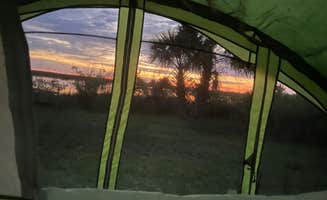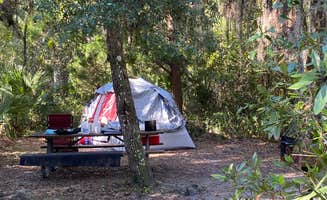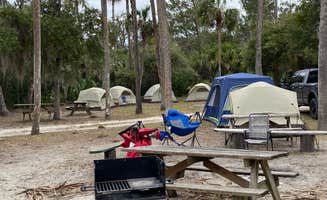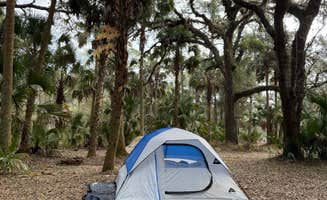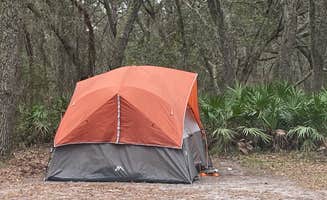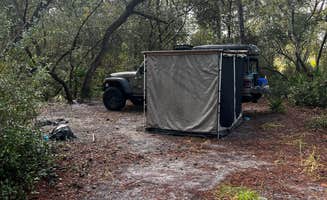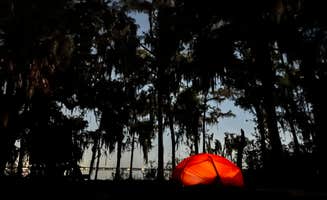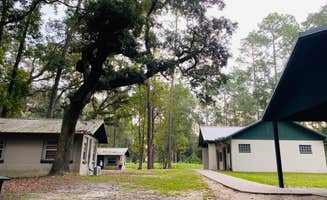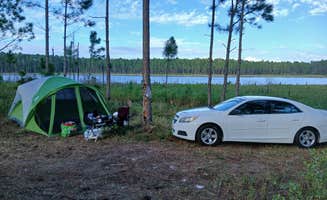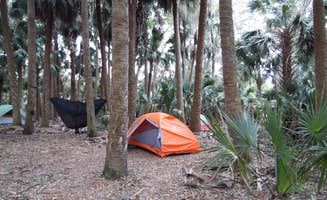Tent campsites near Palm Coast, Florida frequently experience seasonal variations with summer temperatures reaching 90°F and high humidity levels, contrasting with milder winter conditions around 70°F. The region sits at a low elevation typically between 0-25 feet above sea level, making proper drainage at campsites crucial during Florida's frequent afternoon rainstorms. Many primitive sites in the area require advanced planning as they're situated in conservation areas with limited facilities.
What to do
Kayaking from your site: At Princess Place Preserve, waterfront sites offer direct water access. "Some of the tent campsites are directly on one of the small rivers that empties into the Intercostal," notes Reid D., making it ideal for paddlers who want to launch directly from camp.
Hiking diverse trails: Several interconnected trail systems provide opportunities to explore local ecosystems. One visitor at Princess Place Preserve shared, "I did the Hominy Trail which is 2.5 miles long and was well marked. There was gorgeous Live Oak trees with Spanish Moss hanging down, an adorable wild field full of white butterflies and an Eagles Nest Viewing Area."
Fishing in multiple waterways: Cedar Creek Campground provides access to less crowded fishing spots. The area offers freshwater fishing opportunities with various species available. "Rural and beautiful," commented a visitor, highlighting the secluded natural setting that provides peaceful fishing conditions.
Wildlife viewing opportunities: Early mornings and evenings are prime times for wildlife spotting. "We saw deer more frequently than we saw other humans," reported Taylor at Princess Place Preserve, describing the abundance of natural Florida wildlife present throughout the property.
What campers like
Privacy between sites: Moody Campground offers well-spaced waterfront sites. "Sites are well spaced with a lot of well cared for nature park areas between," reported Angie A., appreciating the campground layout that prevents overcrowding.
Clean facilities: Despite primitive settings, many campgrounds maintain serviceable facilities. According to Stuart K. at Haw Creek Preserve State Park, "The shelter lodge... features a promenade with a single picnic table, and further inside, a fairly wide open picnic area offering up a single deck opposite of which, you'll find a restroom and shower facility."
Star gazing opportunities: Clear night skies away from city lights provide excellent astronomical viewing. "Amazing stars -- great view of incredible moon," writes Gary G. about his experience at Cedar Creek Campground, highlighting the benefits of camping in less developed areas.
Elevated tent pads: Many sites feature raised camping platforms to prevent water issues. Louis B. notes at Moody Campground, "The tent sites are elevated which should help keep the soil dryer in case of rain."
What you should know
Water availability varies widely: Not all campgrounds provide potable water. "Keep in mind that there is no water available at the camping sites or the entire park for that matter. Potable or non potable so you have to bring in all drinking water and water for washing dishes," advises Louis B. about camping at Moody Campground.
Primitive camping means minimal amenities: Prepare for basic conditions at many sites. At Caravelle Ranch Wildlife Management Area, Stuart K. describes the setup: "There's only about 5-6 designated camping spots here to choose from, all of which come with just a simple picnic table and makeshift fire ring."
Reservation requirements: Most campgrounds require advance booking, especially during peak seasons. "Sites are reserved well in advance, especially for the weekends so book early," advises Kippy N. regarding Princess Place Preserve.
Access challenges: Some sites require additional effort to reach. Stuart K. explains about Haw Creek Preserve, "This particular spot is somewhat easy to access – in that there's a perfectly fabricated wooden plank pathway to follow, albeit for at least a ¼ mile."
Tips for camping with families
Consider treehouse options: For a unique family experience, Camp Chowenwaw Park offers elevated camping. "We had the Squirrel Run cabin which had AC and 6 bunk beds. Which was great for our family of 6," reports Jenn B., highlighting accommodations suitable for larger family groups.
Pack insect protection: Florida's humid climate means abundant mosquitoes, especially in wooded areas. "There were lots of mosquitoes, so beware of that and bring bug spray," cautions Jenn B. about Camp Chowenwaw Park.
Plan for water activities: Pool access provides relief from summer heat. Jeanene A. notes about Camp Chowenwaw Park, "Pool was very nice and very strictly run by the local Y. It was closed a lot due to distant rumbles of thunder but we did get a few minutes to enjoy."
Bring transportation for gear: When camping sites are distant from parking areas, preparation helps. "It was a good 10 minute hike with our gear to get to the tree houses from parking area near pool. Wagons are provided but pack light to save the trouble," advises Jeanene A.
Tips from RVers
Limited hookup options: Many campsites near Palm Coast have primitive accommodations with few RV amenities. "There's only a small handful of fire rings here, but one HUGE bonus is the single-standing lodge that features a promenade with a single picnic table, and further inside, a fairly wide open picnic area," reports Stuart K. about Haw Creek Preserve, noting facilities that can compensate for limited hookups.
Road condition awareness: Access to more remote sites may challenge larger vehicles. "Took some rough dirt roads to get to this campsite," mentions Haley L. about Cedar Creek Campground, indicating the need for careful route planning with RVs.


